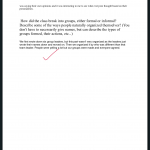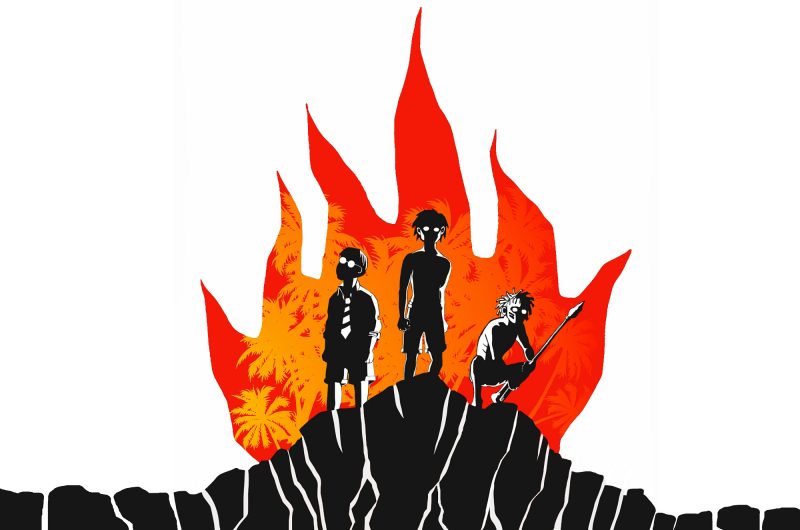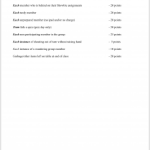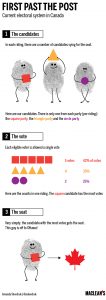Buckle up your seatbelts everyone because this is a unit end post.
Our first major unit in PLP 10 Humanities was WW1, and then we just recently finished our WW2 unit. The last unit we just finished was about the book Lord Of The Flies by William Golding and that is what this post is about.
The driving question for this unit was: “How do we organize ourselves?”
We would be studying human nature, power, corruption, and many more topics relating to this because it has a lot to do with the book Lord Of the Flies. We would look at government systems, politics and current events to help look at this question is different ways. The other major concepts we’d be thinking about are as follows:
• Power and Authority
• Humanity and Inhumanity
• Violence and Destruction
• Human nature
• Civilization and Savagery
• Innocence and Evil
• Individualism and Community
We then wrote out these ideas onto big sheets of paper and as a class brainstormed any thoughts or theories we had about each topic:
After this, while reading the book, we would be looking for evidence of these topics in the literature. But before we started reading, we needed to make some groups. And we did this in quite a unique fashion.
As you may or may not know, in LOTF a group of young boys are stranded on an island and have to survive until they can be rescued. So, in honour of having no adults to organize or watch over us, the task of creating groups was passed onto us. Ms. Maxwell would leave the class, and we had 30 minutes to create 6 equal groups on our own. This process began with 6 team leaders writing their names down at the top of each group list. We then matched up people with the opposite qualities of that team leader in that group and went on until there was no one left. We then all agreed the groups were to our liking and signed a paper. Except this didn’t go as smooth as it sounds.
The entire time we were making these groups, there was a large amount of chaotic noise and distractions. Half the people were huddled around the whiteboard exclaiming their opinions on the groups all at the same time, and the other half of the class didn’t care and was messing around outside the huddle.
In my group, I was with Spencer, Michael and Sydney. We all have different skills and so we all felt that this was a strong group.
- Reflection on the group making
Afterwards, we wrote a reflection on how we personally think the whole experience went. I I’d say that we completed the task, but not in a very civilized or reasonable way.
Another activity we participated in were our concept journals. Essentially theses were just paragraphs where we would talk about our opinions and understandings on the topics like human nature and innocence and evil, to name a few. For my first journal, the one I’m quite happy with, I chose to talk about whether a form of savagery is necessary to build a civilization. Take a look:
I enjoyed writing this paragraph as it got me thinking about whether or not it is indeed necessary to resort to savagery to build a civilization. I feel like the answer would depend on who you ask.
Anyways, moving on. We now began reading the book Lord Of The Flies. Every week on a Wednesday we would meet in class and have a team quiz. We had three different team quizzes, and at each of these checkpoints we would have read 1/3 of the book. As a team, we needed to keep up in the book so we would know the answers to the 10 quiz questions we got every Wednesday. We ended up around 7 or 8 out of 10 for the first two, and on the last one we got 11/10 becsuse of a bonus question. This was really good news for us.
And that is because at the beginning of the unit we were told we’d be keeping track of points per team. We could gain points and lose points based on our behaviour and performance in our humanities class. Here are the points opportunities Ms. Maxwell gave us:
So over the course of the unit, Ms.Maxwell would be keeping track. Our quiz results would be a big part on how many points we received that day. Our team name was the Skinny Dippers, by the way.
Moving on. We were also conveniently studying politics throughout this unit. We looked into the different types of government. For example, there is anarchy, monarchy, and dictatorship. For a quick one class project, my team and I researched a little about dictatorship while the other teams looked into the other forms of government. When we were done, we had a short PowerPoint and we took turns telling the class how each government worked. My team looked into dictatorship, and what it is. We already knew what it was for the most part, as hitler is a huge example of a dictator. You can read about it in this PowerPoint we made in not even 10 mins:
We also looked closer into Canada’s government. We did this by designing diagrams that showed the different people in power in the Canadian government. Here is mine:
We did a few more activities regarding politics and current events as well throughout this unit. Another activity we did was look at the different voting systems used around us. This is an example of First Past The Post, what Canada’s system is based off of.
Other examples are Mixed Member Proportionalism, an extremely complicated version, and Proportional Representation. Politics weren’t my favourite part of this unit as politics are very uninteresting to me, but it’s important to know about the current events around you and also the structure of governments so you know what to do when you get old enough to vote.
Another assignment we had during/after reading the book LOTF was a character analysis chart. William Golding brilliantly designed each character to represent a trait in our society today to reflect true human nature. In this chart we not only talk about each characters physical appearance, but their motives and representation as well.
This was interesting to analyze because of all the hidden deeper meanings in everything in the book. Each character has their own strengths, weaknesses, abilities and problems but all of them are important and act in certain ways because of who they are. The book is definitely an interesting read and can be interpreted many different ways.
Towards the beginning of the unit, we found out we would be conducting some sort of debate at the end of the unit. When I learned that, I was actually quite excited. I was looking forward to creating points and speaking in front of the class, since I wanted to practice my public speaking. Now we were approaching the week of the debates. About a week before the three days where debates would be taking place we finally got our debate topics and statements. As teams, we all submitted our top three choices in order of preference, and then Ms. Maxwell based what debate we would do on that information. We ended up getting our second choice, Power and Authority. Next we received our statement: Be is resolved that power leads to corruption. And finally we received our position: AGAINST. We would be arguing against the statement, trying to prove that power doesn’t lead to corruption.
Next we began our research phase. At first my team and I were stumped. We didn’t know how to defend our point, as we all sort of agreed with the FOR argument. After a day or two of thinking, I suddenly came up with an idea and then pitched it to our team. Our own main statement would be: Power does not corrupt people, rather corrupt people abuse their power. We would say this at the beginning and then elaborate and support that idea throughout the debate.
We then began researching supporting points, which was constricted to only topics we talked about in class. We ended up using the book Lord Of The Flies, as it was a requirement, Adolf Hitler and also Winston Churchill. Once we had our points we planned out who whould say what at what time. Michael and I would do the opening statements, Spencer and Sydney on the rebuttal, and Sydney and I for concluding statements. All that was left to do was wait for the debate to start, which was about 20 minutes of time.
When the debate started, the opposing team, made up of Adam, Izzy, Will and Ryan started off with their opening statements. Then after two minutes, it was our turn and I started us off. At this point, once I started talking, my nervousness faded away and I was able to talk freely. I won’t explain too much detail because guess what? We recorded the whole debate! Listen to this track to hear our whole debate:
After the debate, we reflected on it as a class. Since our debate was the first of three, it was kind of a test round for the other ones. Our class reflection brought up the fact that the debate didnt feel like a debate. And I agreed, my team and I tried to predict what they would say and so we had pretty much prepared what we were going to say for our rebuttal even though that part is supposed to be quick thinking. We wanted the debate to have more back and forth actuin as well so we decided to change the rebuttal from 2 minutes each, to 1 minute but there are two per team, one after another. And the last aspect of the debate we needed more of was audience engagement. The audience (the rest of the class) was just kind of there, so we wanted to have them clap and cheer after good points and such. I definetly agreed with these changes, as I felt they would make the next two debates a lot better.
This being said, I would do my debate again in a heartbeat. Even though we still won, and by only one point, I want to make it a lot better. I would like to make it a lot less scripted and I’d focus more on listening to the opposing team’s argument and trying to counter it. I want my debate to feel like a real debate, and have it more intense. I really enjoyed the topic of the debate and found it incredibly interesting. The part that stuck out to me the most with this debate is the fact that we needed to research our ideas, put that information into points, develop an opinion, and turn that opinion into a captivating argument. This was incredibly fun for me and really got me thinking. We were also pulling in everything we’ve talked about in class, which made it even more interesting. Overall I had a lot of fun with this debate and learned a lot.
This unit was by far my favourite this year in Humanities. That is because of the multiple aspects, the team choosing, the book, the point system, politics and government, and the debate of course. I also really enjoyed talking and learning about the different topics like human nature, civilization and savagery, and power and authority and how much it ties into WWII and other historic events. And also how it ties into events that are happening today in our world with different governments and political figures. In conclusion, I learned an absolute ton in this unit and had just as much fun. I really enjoyed the topics and activities we all did and I’m happy with the work I completed in this unit.
Thats all,
See you




















